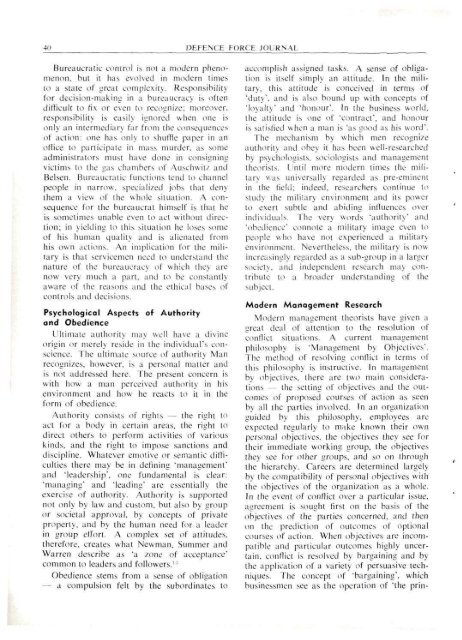ISSUE 1 : Nov/Dec - 1976 - Australian Defence Force Journal
ISSUE 1 : Nov/Dec - 1976 - Australian Defence Force Journal
ISSUE 1 : Nov/Dec - 1976 - Australian Defence Force Journal
Create successful ePaper yourself
Turn your PDF publications into a flip-book with our unique Google optimized e-Paper software.
40 DEFENCE FORCE JOURNALBureaucratic control is not a modern phenomenon,but it has evolved in modern timesto a state of great complexity. Responsibilityfor decision-making in a bureaucracy is oftendifficult to fix or even to recognize; moreover,responsibility is easily ignored when one isonly an intermediary far from the consequencesof action: one has only to shuffle paper in anoffice to participate in mass murder, as someadministrators must have done in consigningvictims to the gas chambers of Auschwitz andBelsen. Bureaucratic functions tend to channelpeople in narrow, specialized jobs that denythem a view of the whole situation. A consequencefor the bureaucrat himself is that heis sometimes unable even to act without direction;in yielding to this situation he loses someof his human quality and is alienated fromhis own actions. An implication for the militaryis that servicemen need to understand thenature of the bureaucracy of which they arenow very much a part, and to be constantlyaware of the reasons and the ethical bases ofcontrols and decisions.Psychological Aspects of Authorityand ObedienceUltimate authority may well have a divineorigin or merely reside in the individual's conscience.The ultimate source of authority Manrecognizes, however, is a personal matter andis not addressed here. The present concern iswith how a man perceived authority in hisenvironment and how he reacts to it in theform of obedience.Authority consists of rights — the right toact for a body in certain areas, the right todirect others to perform activities of variouskinds, and the right to impose sanctions anddiscipline. Whatever emotive or semantic difficultiesthere may be in defining 'management'and 'leadership', one fundamental is clear:'managing' and 'leading' are essentially theexercise of authority. Authority is supportednot only by law and custom, but also by groupor societal approval, by concepts of privateproperty, and by the human need for a leaderin group effort. A complex set of attitudes,therefore, creates what Newman, Summer andWarren describe as 'a zone of acceptance'common to leaders and followers. 1 'Obedience stems from a sense of obligation— a compulsion felt by the subordinates toaccomplish assigned tasks. A sense of obligationis itself simply an attitude. In the military,this attitude is conceived in terms of'duty', and is also bound up with concepts of'loyalty' and 'honour'. In the business world,the attitude is one of 'contract', and honouris satisfied when a man is 'as good as his word'.The mechanism by which men recognizeauthority and obey it has been well-researchedby psychologists, sociologists and managementtheorists. Until more modern times the militarywas universally regarded as pre-eminentin the field; indeed, researchers continue tostudy the military environment and its powerto exert subtle and abiding influences overindividuals. The very words 'authority' and'obedience' connote a military image even topeople who have not experienced a militaryenvironment. Nevertheless, the military is nowincreasingly regarded as a sub-group in a largersociety, and independent research may contributeto a broader understanding of thesubject.Modern ManagementResearchModern management theorists have given agreat deal of attention to the resolution ofconflict situations. A current managementphilosophy is 'Management by Objectives'.The method of resolving conflict in terms ofthis philosophy is instructive. In managementby objectives, there are two main considerations— the setting of objectives and the outcomesof proposed courses of action as seenby all the parties involved. In an organizationguided by this philosophy, employees areexpected regularly to make known their ownpersonal objectives, the objectives they see fortheir immediate working group, the objectivesthey see for other groups, and so on throughthe hierarchy. Careers are determined largelyby the compatibility of personal objectives withthe objectives of the organization as a whole.In the event of conflict over a particular issue,agreement is sought first on the basis of theobjectives of the parties concerned, and thenon the prediction of outcomes of optionalcourses of action. When objectives are incompatibleand particular outcomes highly uncertain,conflict is resolved by bargaining and bythe application of a variety of persuasive techniques.The concept of 'bargaining', whichbusinessmen see as the operation of 'the prin-
















